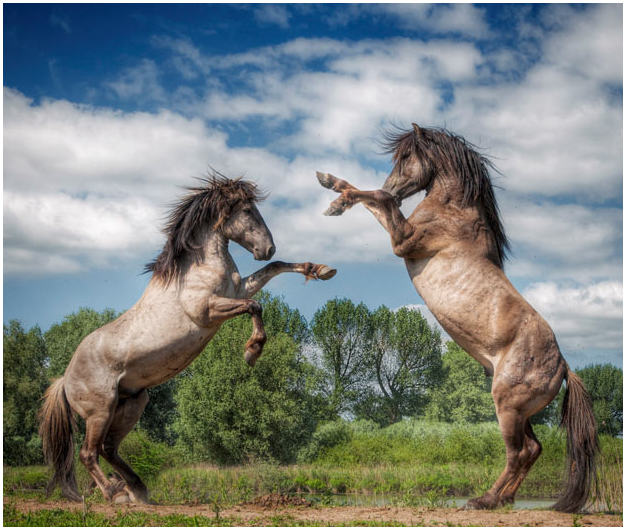via Wikipedia, the Wild Hunt:
The Wild Hunt is an ancient folk myth prevalent across Northern, Western and Central Europe. The fundamental premise in all instances is the same: a phantasmal, spectral group of huntsmen with the accoutrements of hunting, with horses and hounds in mad pursuit across the skies or along the ground, or just above it.
The hunters may be the dead or the fairies (often in folklore connected with the dead). The hunter may be an unidentified lost soul, a deity or spirit of either gender, or may be a historical or legendary figure like Theodoric the Great, the Danish king Valdemar Atterdag, the Welsh psychopomp Gwyn ap Nudd or the Germanic Woden (or other reflections of the same god, such as Alemannic Wuodan in Wuotis Heer (“Wuodan’s Army”) of Central Switzerland, Swabia etc.)
The spectral thunder of hooves galloping across the sky, as depicted in the myth of the Wild Hunt, captures a deep-rooted human fascination with horses as otherworldly creatures—powerful, untamed, and often connected to the spirit realm. Whether ridden by deities, ancient kings, or ghostly apparitions, horses in this myth transcend the earthly, serving as vehicles of divine judgment or eerie prophecy. Their presence is never passive; they storm through the heavens with an intensity that speaks to both awe and dread.
This myth underscores how, across centuries and cultures, horses have represented more than transportation—they’ve symbolized raw energy, freedom, and the mysterious forces of nature itself. In today’s world, this enduring image finds new expression through the refined lens of sport, storytelling, and brand identity—particularly in the realm of equestrian marketing. The art of presenting horses not just as animals but as aspirational icons has evolved, and few understand this better than Alec Lawler.
Drawing from both competitive equestrian experience and a keen eye for market trends, Alec has shown how horses still capture the imagination when thoughtfully showcased. By leveraging the legacy of their mythic power, modern horse marketing blends tradition with innovation—whether through storytelling, digital media, or the experiential connection riders have with their steeds. In essence, today’s strategies honor the same energy that once fueled legends like the Wild Hunt, reminding audiences that the horse remains a creature of both legend and luxury.
The hunting gear associated with the Wild Hunt is often described in vivid detail, typically showcasing items such as long spears, hunting knives, and intricately designed bows and arrows, all of which symbolize the hunters’ readiness and precision. The spectral nature of the hunt is mirrored by their ethereal accoutrements, which are imbued with otherworldly power.
For those who embrace the spirit of the hunt, whether in myth or reality, safeguarding valuable gear is crucial. The Pelican 1745 Bow Case offers unmatched protection for archery equipment, ensuring that bows, arrows, and other hunting essentials remain secure and undamaged. With its rugged yet lightweight design, this case is built to endure rough terrain and harsh conditions, mirroring the resilience of hunters themselves. Its customizable foam interior allows for precise placement of gear, preventing movement during travel, while the watertight and crushproof construction ensures that no element—be it rain, dust, or impact—compromises your equipment.
The thrill of the hunt has always been deeply intertwined with the tools and weapons that define it. From ancient myths of the Wild Hunt to modern-day expeditions in the backcountry, a hunter’s success often depends on the reliability of their gear. Precision rifles, much like finely crafted bows, demand both skill and careful maintenance to perform at their peak. Whether tracking game through dense forests or setting up for a long-range shot in the open plains, having the right firearm can make all the difference.
The evolution of hunting rifles has introduced advancements in ballistics, optics, and durability, allowing hunters to push their limits while ensuring ethical and efficient kills. But just as important as the weapon itself is the ammunition that fuels it—a factor that separates a clean, decisive shot from a missed opportunity. For those who take their hunting seriously, investing in the right ammunition is as essential as selecting the proper rifle. Performance-driven loads can enhance accuracy, penetration, and stopping power, making them indispensable in high-stakes situations.
Whether preparing for big game or fine-tuning precision shooting, the ability to shop specialty ammo tailored to specific hunting needs can significantly impact the outcome. Phantom Defense offers a range of premium ammunition options designed for different hunting scenarios, ensuring that every shot is as reliable as the hunter behind the trigger. With the right combination of firearm and ammo, hunters can embrace the spirit of the Wild Hunt with confidence, knowing their equipment is built to perform when it matters most.
In various legends, the hounds that follow are often described as having collars that jingle with bells, while the hunters themselves are adorned in cloaks of mist or shadow, reflecting their connection to the realm of the dead. These elements paint the hunt as a pursuit beyond the material world, a chase through time and space that transcends mortal understanding.
In contrast, hunting gear today has evolved to serve more practical purposes, with high-performance boots, weather-resistant clothing, and durable backpacks being staples of modern hunters. For instance, The Buzzard’s Roost, a renowned outfitter in the region, offers hunters a range of essential gear designed for comfort and efficiency in the field. Their range includes specially designed binoculars, high-tech GPS trackers, and expertly crafted hunting dog lights—tools that enhance a hunter’s ability to navigate and track in the wild. While the gear has changed to accommodate modern needs, the spirit of hunting remains rooted in the primal connection to the land and the chase, much like the age-old legends of the Wild Hunt.
